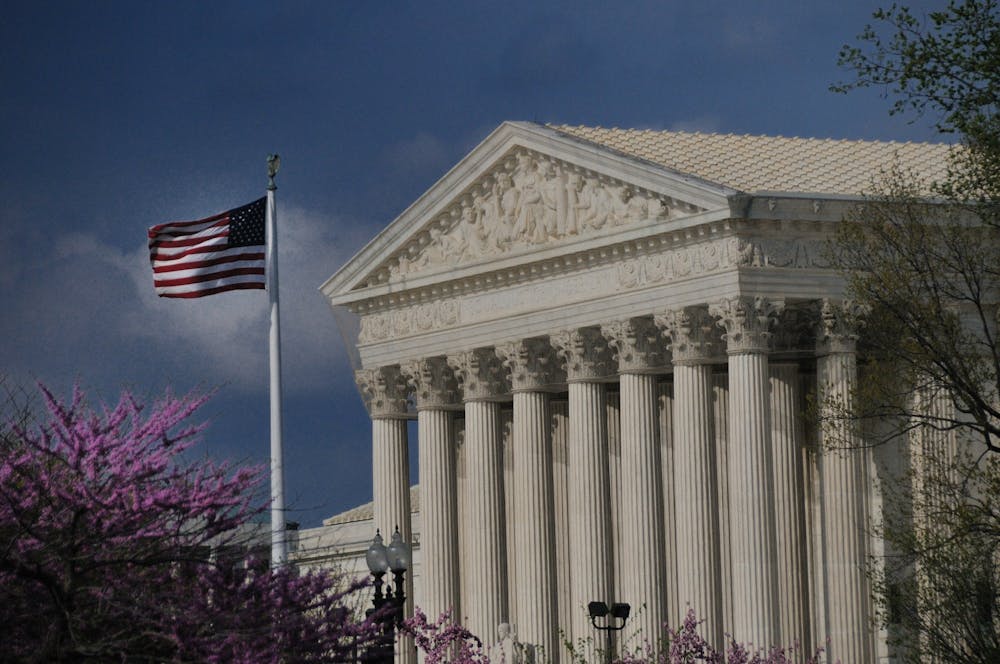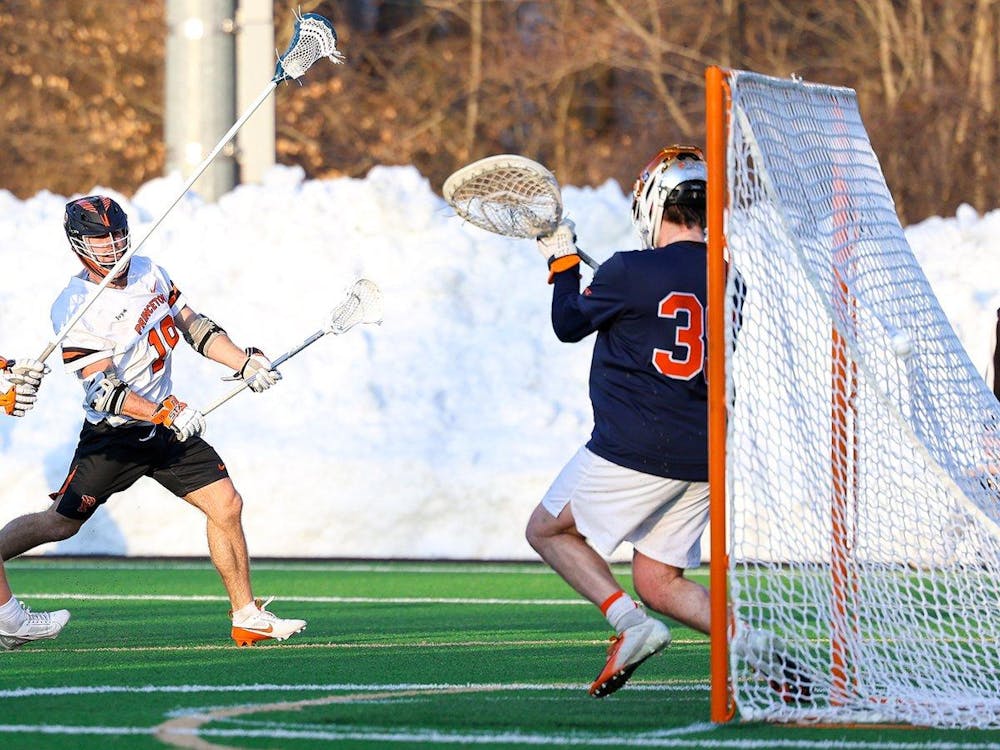The Supreme Court struck down affirmative action on Thursday, overhauling almost 40 years of precedent in considering race in admissions.
The case, Students for Fair Admissions (SFFA) v. President and Fellows of Harvard College was decided along ideological lines, with a 6–2 conservative majority. Justice Ketanji Brown Jackson recused herself from the case, having attended Harvard and served on its Board of Overseers. The companion case, Students for Fair Admissions (SFFA) v. University of North Carolina (UNC), was decided 6–3, also on ideological lines.
The long-expected decision will have a significant impact on Princeton’s admissions process, which has taken race into consideration in admissions since 1963. Numerous studies have found that percentages of Black and Hispanic students will likely decrease at many colleges as a result of this ruling, while the percentage of Asian-American students is likely to increase.
Awaiting a response from Princeton
The decision reached by the justices will have far-reaching consequences, leaving Princeton and other colleges to navigate uncharted territory in preserving racial diversity without a key tool admissions officers have relied on for decades.
In his January State of the University letter, President Christopher L. Eisgruber ’83 wrote that the University will “be creative and persistent in our efforts to preserve and build upon the diversity of our scholarly and educational community,” in a post-affirmative action world.
A variety of alternatives to affirmative action have been posed by experts, including giving preference to students for whom English is a second language or those coming from a lower socioeconomic status, increasing transfer and veteran students admissions, eradicating use of standardized testing, or eliminating early action.
In an interview with the Philadelphia Inquirer earlier this year, Eisgruber said that the University pushes “very hard on socioeconomic diversity.”

“I don’t think [that] is a substitute for racial diversity but it does help … It removes one kind of barrier that might also stand in the way of racial diversity,” he said.
A model presented by SFFA in federal court in 2019 found that representation of Black students in Harvard’s incoming class would decrease by nearly a third if students from economically disadvantaged backgrounds and not racial minorities were given preference.
The model found that to achieve a racial makeup comparable to that afforded by affirmative action, colleges would need to give preference to students coming from lower socioeconomic statuses in addition to eliminating legacy admissions and standardized testing and increasing the number of disadvantaged applicants.
Legacy admissions have long been a contentious issue and one that is also being litigated through a lawsuit filed in federal court by five former undergraduate students, accusing 16 private colleges of abusing a 1994 law that allows schools to collaborate in forming financial aid policy, as long as they conduct “need-blind” admissions. The petitioners allege that some of the schools — which include Yale, Brown, M.I.T., Columbia, Cornell, and the University of Pennsylvania — consider the financial need of waitlisted applicants, while others, by offering legacies preference, put students needing financial aid at a disadvantage.

“Privileging the wealthy and disadvantaging the financially needy are inextricably linked,” the lawsuit states. The schools’ motion to dismiss was rejected last August and the trial is expected to proceed.
Eisgruber has appeared reluctant to discontinue legacy admissions, telling the Inquirer that “it’s an important part of who we are as an institution that creates a community that persists long after somebody graduates.”
Yet Princeton may struggle in the wake of the decision. In a court brief filed in Aug. 2022, representatives of the University of Michigan noted the difficulties the school faced after affirmative action was outlawed in the state in 2006. In response, the school increased outreach to applicants from disadvantaged socioeconomic backgrounds, reduced early action admissions, created new scholarships for minority students, and established an office of Diversity, Equity, and Inclusion — but, as the brief notes, “Despite having spent more than a decade successfully enrolling substantially more socioeconomically disadvantaged students, race-neutral admissions policies have not significantly increased enrollment of underrepresented minorities.”
It remains to be seen what Princeton’s approach will be.
Eisgruber told the ‘Prince’ last fall that “we will do our best to be creative within the limits of the law.”
The long road to this point
Princeton has defended its admissions protocols in light of past challenges to affirmative action by emphasizing the “holistic” nature of its process. The University maintains that it considers race as just one factor in conjunction with other aspects of individual identity, including academic accomplishment and experience. The University does not use a quota system that would reserve a specified number of spots for students of a certain race. Quota systems were declared unconstitutional in Regents of the University of California v. Bakke, a landmark case on affirmative action in 1978. Bakke protected consideration of race in admissions as just one factor, entrenching use of affirmative action as we knew it.
The court’s majority in Bakke described Harvard’s admissions process as an “illuminating example,” given that race was considered as part of myriad factors, including socioeconomic status and consideration of what students’ experiences would bring to the Harvard environment, rather than there being a quota for students of a specific racial background.
Since Bakke, there have been a number of challenges to affirmative action, but the court has maintained the general principle that considering race as a factor is not illegal discrimination on the basis of race.
In 2003, the court considered Grutter v. Bollinger and Gratz v. Bollinger, two cases that challenged the use of a system where applicants get points based on the race in the admissions systems of the University of Michigan Law School and undergraduate program respectively. The court struck down the specific system, but maintained that consideration of race was permissible given that the diversity of the student body was a compelling interest for the school. Yet the majority decision warned that affirmative action may have a time limit.
“A core purpose of the Fourteenth Amendment was to do away with all governmentally imposed discrimination based on race,” then-Justice Sandra Day O’Connor wrote in the majority opinion in Grutter. “Accordingly, race-conscious admissions policies must be limited in time. This requirement reflects that racial classifications, however compelling their goals, are potentially so dangerous that they may be employed no more broadly than the interest demands.”
The Harvard case which the court just ruled on arose from a 2014 lawsuit filed by SFFA, a nonprofit of more than 20,000 students and parents that alleged the University’s admission process discriminates against Asian American applicants, thereby violating Title VI of the Civil Rights Act of 1964, which prohibits unequal treatment on the basis of race, color, or national origin.
SFFA, which was founded by conservative activist Edward Blum who also filed the lawsuits against both schools, accusing Harvard admissions officers of applying subjective personal ratings to Asian American students.
In the case against UNC, SFFA alleges that the university discriminates against both Asian American and white applicants, violating the 14th Amendment’s Equal Protection Clause, which prohibits states from denying people equal protection of their laws.
UNC is subject to this 14th Amendment standard because it is a public university.
Princeton, while not named in this case, has had run-ins with affirmative action lawsuits in the past. It was investigated in 2015 after being accused of violating Title VI of the Civil Rights Act by two applicants who alleged that the University’s admission processes discriminated against Asian applicants. The United States Department of Education’s Office for Civil Rights found that the University’s approach was constitutional. Then Dean of Admissions Janet Rapelye told the ‘Prince’ that the “admission process is done in an individualistic and holistic way.”
The Office for Civil Rights’ report had found that the number of Asian American admits was steadily increasing in the seven-year period prior to the investigation — admits of Asian descent formed 14.2 percent of the Class of 2007 and 25.4 percent of the Class of 2014. The report concluded that this trend was inconsistent with use of race-based quotas.
Rapelye had told the ‘Prince’ that the University does not use a score system that rewards points to students on the basis of race, as the students were alleging.
Today’s decision come down as the Supreme Court is battling a series of ethics crises. In April, ProPublica revealed that Justice Clarence Thomas accompanied Republican mega donor Harlan Crow on luxury vacations and took trips on the Dallas businessman’s private yacht, all undisclosed.
Politico also reported that Justice Neil Gorsuch sold his 40-acre plot of land in Colorado to Brian Duffy, the chief executive of Greenberg Traurig, one of the country’s biggest law firms and one which often represents parties in Supreme Court Cases. Gorsuch received an offer from Duffy nine days after being confirmed by the senate to serve on the high court.
On Tuesday, another ProPublica report found that Justice Samuel Alito ’72 had accepted trips and gifts from billionaire Paul Singer, whose hedge fund has come before the court at least ten times. Notably, in a 2014 case involving a dispute between the hedge fund and the nation of Argentina, Alito failed to recuse himself, siding with the majority in a decision that led to the hedge fund being paid $2.4 billion.
After refusing to answer questions from ProPublica reporters, Alito penned an op-ed in The Wall Street Journal, claiming that he was unaware of Singer’s connection to the cases he heard.
The ruling will be one of the most significant shocks to Princeton’s admissions program in the last 20 years.
“We can’t pretend it’s going to be easy,” Eisgruber noted in his interview with the ‘Prince’ last fall.
This piece is breaking and will be updated.
Sandeep Mangat is a head News editor for the ‘Prince.’
Please send any corrections to corrections[at]dailyprincetonian.com.








